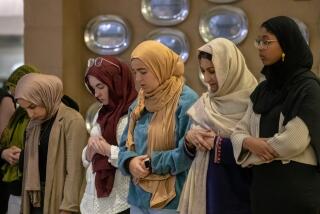The Oddities of a Loony Calendar
- Share via
Aren’t Ash Wednesday and Easter coming awfully early this year? And how come Passover and other Jewish holidays are arriving so late in 1997, with Hanukkah only one night before Christmas Eve? Why will Muslims observe Ramadan a second time this year?
The answers could drive you loony--a word derived from luna (Latin for moon), as is the expression lunar month. For it has a lot to do with lunar calendars, ancient traditions and the appearances of the full moon and the new moon.
The questions arose as Western Christianity on Wednesday began its spiritual trek toward this year’s Easter--March 30--with Ash Wednesday rites.
Clergy in Roman Catholic, Episcopal, Lutheran and some traditional Protestant churches dabbed ashes on the foreheads of followers as a symbol of human mortality and penance. The Lenten period leads up to Easter Sunday, commemorating the biblical story of Jesus’ resurrection.
The early Christian churches decided in AD 325 that Easter should be the first Sunday after the first full moon after the vernal equinox--the first day of spring, when day and night balance out at 12 hours each.
The Eastern Orthodox churches, however, have stuck to another early church proviso--that the formula be followed as long as Easter comes on the Sunday after the start of Passover. The Gospel accounts of Jesus’ last days note that it was Passover time in Jerusalem, and Eastern Orthodoxy has retained that tie to the Jewish calendar.
Thus, millions of Orthodox Christians in America--whose church traditions are rooted in Greece, the Balkan and Slavic countries, and in the Eastern Mediterranean--will celebrate Easter on April 27 this year because Passover begins on the evening of April 21.
“Normally, about 17 out of every 19 years, the Christian formula of ‘the first Sunday after the first full moon after the vernal equinox’ will place Easter after the start of Passover,” said USC engineer-mathematician Solomon Golomb, director of research for the Annenberg Center for Communications.
Golomb delights in the arcane history of calendars and religious holidays. In an interview, he noted that Passover, which recalls the ancient Jewish exodus from Egypt, “can start only on four of the seven days of the week based on a complex formula.”
Passover, Yom Kippur and Hanukkah all come much later this year than last, he noted, because this is one of those years when the 354-day lunar calendar used by Judaism must be adjusted to conform with the 365-day solar calendar in common use around the world.
During every 19-year cycle, an extra lunar month of 29 days is added to the Hebrew calendar on years 3, 6, 8, 11, 14, 17 and 19, according to Golomb. In other words, the calendar gets a 13th month each one of those years.
There are other reasons for adding extra months to a religious-cultural calendar, the main one being the desire to celebrate holidays in a customary season.
The Jewish festivals of Passover, Shavuot and Sukkot, for example, are rooted in tradition to the early spring, late spring and fall seasons, for example.
Likewise, the date of the Chinese New Year, which was celebrated last weekend, varies from year to year because a lunar calendar is used. “But every so often the Chinese insert an extra lunar month to keep holidays appearing around the same time of year,” Golomb said.
“The notable exception is Islam, which totally ignores the solar year,” said Golomb.
For instance, Muslims observed daytime fasting for the month of Ramadan from Jan. 10 through last Saturday. They will also start the Ramadan fast again on Dec. 30 this year.
At least Judaism and Islam agree among themselves when their major holidays are to be observed--more than can be said for Christianity.
The eastern and western wings of Christendom have occasionally expressed a desire to agree on a common date for Easter. For example, Catholicism’s Second Vatican Council in 1964 recognized the hope that all churches would “agree . . . on one day for the celebration of Easter” in the interest of Christian unity.
Greek Orthodox layman Nicholas Royce of North Hollywood laments year after year that Orthodox Easter goes unacknowledged. A retired publicist and entertainer, Royce has for decades chided government officials, journalists and others for not giving due recognition to Eastern Orthodox Christians who, by some estimates, number about 5 million in this country.
“It’s irritating to me that we are ignored on calendars,” said Royce. “But few people want to make an issue of it.”
Though Eastern Orthodox churches might get more public recognition by accepting the Western church formula, Royce said Eastern Orthodoxy should stand firm with its rule for determining Easter, which he said was the norm for Christianity in its early centuries.
What church leaders cannot achieve, however, calendars sometimes do.
Easter last fell on the same date for all Christians in 1990. The next time will be April 15, 2001, the first Easter of the 21st century.
More to Read
Sign up for Essential California
The most important California stories and recommendations in your inbox every morning.
You may occasionally receive promotional content from the Los Angeles Times.













